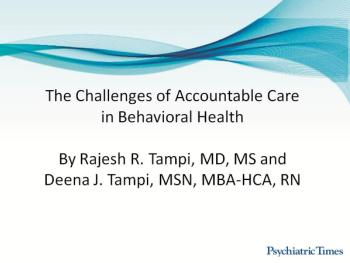
In this CME article, learn how to evaluate older adults who present with significant appetite and weight changes for the presence of an eating disorder.

In this CME article, learn how to evaluate older adults who present with significant appetite and weight changes for the presence of an eating disorder.

What treatments are available for those with older age bipolar disorder?

Between 1980 and 1998, the relative frequency of late-onset bipolar disorder increased from 1% to 11%. How can you best assess for this condition?

In this CME, evaluate the treatment options for depression among older adults.

In this CME article, learn about the best ways to assess depression in the geriatric population.

Earn CME Credit by learning more about multiple sclerosis and how it affects patients.

Although normally associated with children, attention-deficit/hyperactivity disorder can also persist in adulthood, presenting challenges to both patients and clinicians.

Often misdiagnosed as other psychiatric disorders, FTD is the third most common type of dementia and the second most common among patients 65 years or younger. How to spot the signs.

Addiction among older adults is associated with worse medical outcomes and increased economic burden of care. The long-term use of psychoactive substances can result in adverse neurological outcomes even at therapeutic doses.

The development of specific diagnostic criteria that are applicable to older adults can aid in the accurate diagnosis of psychiatric disorders in late life.

Behavioral health care providers are needed now more than ever to help support frontline caregivers and to provide access to care. Deena Tampi, MSN, MBA-HCA, offers insights about caring for the caregiver as well as providing access to care.

Parkinson disease psychosis is associated with worsening quality of life, greater caregiver distress, higher rates of institutionalization, increased mortality, and greater health care costs. The authors explore medical, psychosocial, and psychological factors associated with PD psychosis.

BPSD is associated with worse outcomes for patients with dementia. Management is not standardized, but protocols generally involve the treatment of underlying symptoms followed by the use of nonpharmacological management techniques and evidence-based pharmacotherapy for refractory BPSD.

There is a paucity of information on complementary and integrative therapies, especially when they pertain to the topic of mental health and aging. But that's all changed.

The latest research on the global risk of Alzheimer disease and other dementias.

An in-depth look into the behavioral and psychological symptoms of dementia.

Presenting a Q&A with Dr Rajesh Tampi and Deena Tampi on the issue of behavioral health in accountable care.

Published: October 16th 2020 | Updated:

Published: August 3rd 2020 | Updated:

Published: March 8th 2022 | Updated:

Published: April 7th 2022 | Updated:

Published: December 14th 2020 | Updated:

Published: February 23rd 2023 | Updated: